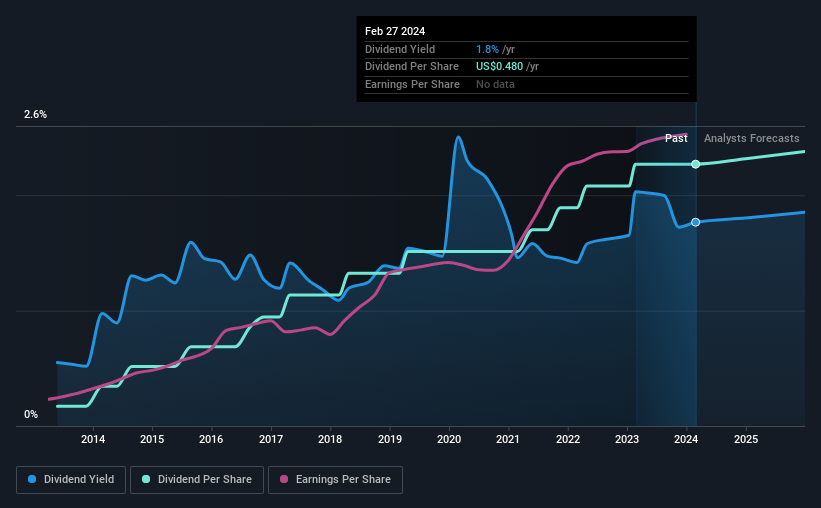- United States
- /
- Banks
- /
- NasdaqGM:UNTY
Unity Bancorp's (NASDAQ:UNTY) Shareholders Will Receive A Bigger Dividend Than Last Year
Unity Bancorp, Inc. (NASDAQ:UNTY) has announced that it will be increasing its periodic dividend on the 29th of March to $0.13, which will be 8.3% higher than last year's comparable payment amount of $0.12. This takes the annual payment to 1.8% of the current stock price, which unfortunately is below what the industry is paying.
Check out our latest analysis for Unity Bancorp
Unity Bancorp's Dividend Forecasted To Be Well Covered By Earnings
If it is predictable over a long period, even low dividend yields can be attractive.
Unity Bancorp has a long history of paying out dividends, with its current track record at a minimum of 10 years. While past records don't necessarily translate into future results, the company's payout ratio of 12% also shows that Unity Bancorp is able to comfortably pay dividends.
Over the next 3 years, EPS is forecast to expand by 15.0%. Analysts estimate the future payout ratio will be 12% over the same time period, which is in the range that makes us comfortable with the sustainability of the dividend.

Unity Bancorp Has A Solid Track Record
Even over a long history of paying dividends, the company's distributions have been remarkably stable. Since 2014, the dividend has gone from $0.0364 total annually to $0.48. This works out to be a compound annual growth rate (CAGR) of approximately 29% a year over that time. We can see that payments have shown some very nice upward momentum without faltering, which provides some reassurance that future payments will also be reliable.
The Dividend Looks Likely To Grow
Some investors will be chomping at the bit to buy some of the company's stock based on its dividend history. Unity Bancorp has impressed us by growing EPS at 14% per year over the past five years. Unity Bancorp definitely has the potential to grow its dividend in the future with earnings on an uptrend and a low payout ratio.
We Really Like Unity Bancorp's Dividend
Overall, a dividend increase is always good, and we think that Unity Bancorp is a strong income stock thanks to its track record and growing earnings. Earnings are easily covering distributions, and the company is generating plenty of cash. All of these factors considered, we think this has solid potential as a dividend stock.
It's important to note that companies having a consistent dividend policy will generate greater investor confidence than those having an erratic one. Still, investors need to consider a host of other factors, apart from dividend payments, when analysing a company. Earnings growth generally bodes well for the future value of company dividend payments. See if the 3 Unity Bancorp analysts we track are forecasting continued growth with our free report on analyst estimates for the company. Looking for more high-yielding dividend ideas? Try our collection of strong dividend payers.
The New Payments ETF Is Live on NASDAQ:
Money is moving to real-time rails, and a newly listed ETF now gives investors direct exposure. Fast settlement. Institutional custody. Simple access.
Explore how this launch could reshape portfolios
Sponsored ContentNew: AI Stock Screener & Alerts
Our new AI Stock Screener scans the market every day to uncover opportunities.
• Dividend Powerhouses (3%+ Yield)
• Undervalued Small Caps with Insider Buying
• High growth Tech and AI Companies
Or build your own from over 50 metrics.
Have feedback on this article? Concerned about the content? Get in touch with us directly. Alternatively, email editorial-team (at) simplywallst.com.
This article by Simply Wall St is general in nature. We provide commentary based on historical data and analyst forecasts only using an unbiased methodology and our articles are not intended to be financial advice. It does not constitute a recommendation to buy or sell any stock, and does not take account of your objectives, or your financial situation. We aim to bring you long-term focused analysis driven by fundamental data. Note that our analysis may not factor in the latest price-sensitive company announcements or qualitative material. Simply Wall St has no position in any stocks mentioned.
About NasdaqGM:UNTY
Unity Bancorp
Operates as the bank holding company for Unity Bank that provides commercial and retail banking services.
Flawless balance sheet with solid track record and pays a dividend.
Similar Companies
Market Insights
Weekly Picks

Early mover in a fast growing industry. Likely to experience share price volatility as they scale


A case for CA$31.80 (undiluted), aka 8,616% upside from CA$0.37 (an 86 bagger!).


Moderation and Stabilisation: HOLD: Fair Price based on a 4-year Cycle is $12.08
Recently Updated Narratives


Title: Market Sentiment Is Dead Wrong — Here's Why PSEC Deserves a Second Look


An amazing opportunity to potentially get a 100 bagger

Amazon: Why the World’s Biggest Platform Still Runs on Invisible Economics
Popular Narratives


Crazy Undervalued 42 Baggers Silver Play (Active & Running Mine)


MicroVision will explode future revenue by 380.37% with a vision towards success


NVDA: Expanding AI Demand Will Drive Major Data Center Investments Through 2026
Trending Discussion


